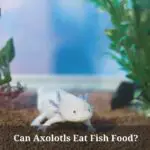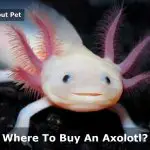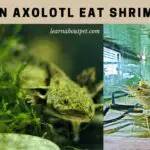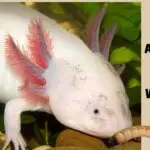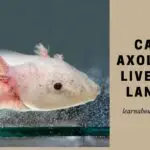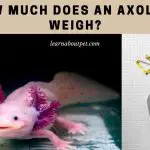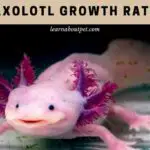People often express interest in knowing how long axolotls can go without food. For instance, if you are an axolotl owner, and you are planning to be away for some time, you may find information on how long they can go without food useful. This article explores that issue comprehensively.
How long can axolotls go without food? Adult axolotls can usually go for as long as 2 weeks without food. But baby axolotls are only able to last a few days (usually 4-5 at most) without food.
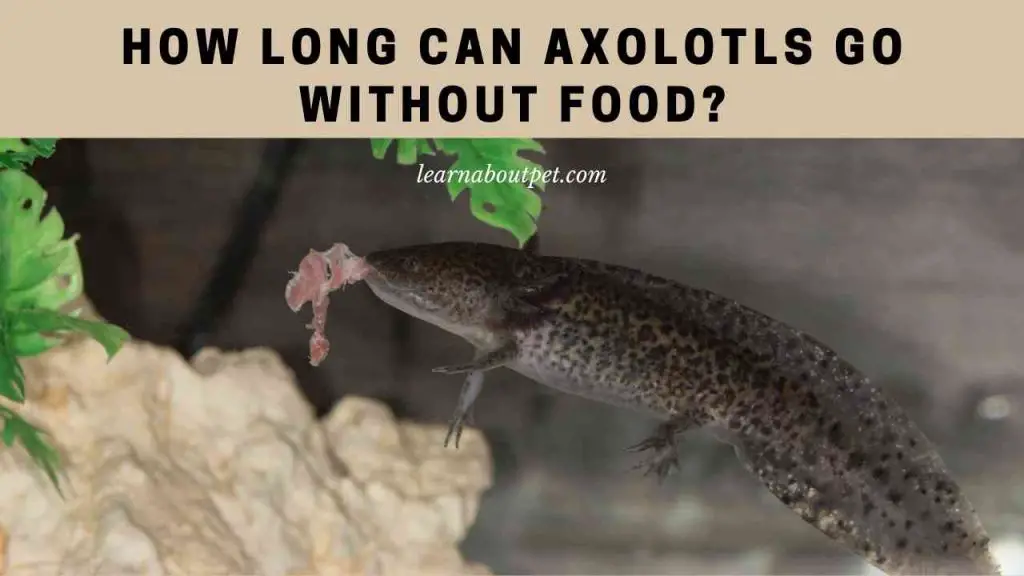
What Do Axolotls Eat?
Before delving deeply into answering the how long can axolotls go without food question, it is important for us to first understand what they eat.
This may yield insights that will be useful to us later on, in answering the how long should axie go without food question.
So, indeed, what do axolotls eat? Axolotls are carnivorous, and they eat things like insects, worms and various small fish. They are also capable of eating tadpoles.
When kept as pets, axolotls are able to eat blackworms, mealworms and earthworms alongside shrimp and daphnia.
They can also eat commercial pellets, including certain fish pellets.
It is worth noting that many of these things that axolotls eat require quite a lot of time to digest.
That bit of information may come in handy later on, while answering the how long can axolotls go without food question deeply.
How Often Should Axolotls Be Fed?
How often to feed axolotl depends on what stage of life it is in.
If it is an adult axolotl, then you should ideally feed it 2-3 times per week.
On the other hand, if it is a juvenile axolotl you should feed it every other day. Or even daily. (A juvenile is like in the 5 month to 1 year old age range).
And if it is a baby axolotl (like from when it hatches to when it is 5 months), you should feed it daily.
But it is worth remembering that people don’t always recall the precise ages of their axolotls. Sometimes, they have to go with the axolotl’s sizes.
That is how, for instance, someone may end up asking: how often should I be feeding a 6-inch axolotl?
And the answer is that a 6-inch axie is likely to be in the ‘juvenile’ category. So feeding him every other day (or even daily) would be ideal.
While at it, we may mention that axolotls do always eat when we want them to.
You may set out to feed your axolotl 2-3 times a week. But it is not automatic that it will actually accept to eat those 2-3 times a week.
Sometimes, so erratic are their feeding habits that you have people seeking to know how to train axolotls to regularly eat food.
Therefore these are simply general guidelines, on how often to feed them.
Ultimately, this information on how often to feed axolotls may be useful in giving us the right perspective. That is, the right perspective in answering the how long can axolotls go without food question.
How Long Can Axolotls Go Without Food?
Axolotls are remarkable in that they can go for quite long periods of time without food.
Adult axolotls can usually go for as long as two weeks without food, and without seeming to suffer any harm.
In fact, there are even axolotl owners who report cases of their axies going for 3 weeks without food.
And there are extreme cases where you may hear an axolotl owner saying: my axolotl hasn’t eaten in over a month!
Now the axolotls that manage to go for 3 weeks or for a month without eating may be exceptional.
But an ‘average’ adult axolotl should be able to do 2 weeks quite comfortably, without food.
Note, however, that this is with regard to adult axolotls. For baby axolotls, the limit (in terms of time they can go without food) is lower.
In most cases, you find that a baby axolotl is only able to do just a few days (in the 4-5 days range) without food.
But people often find these limits in terms of how long axolotls can go without food unbelievable.
And that is why, even after getting these guidelines, you may still find someone asking a friend, how long do you think an Axolotl can go without food?
But it is worth understanding that, by nature, axolotls are opportunistic feeders. In the wild, they only get to eat when a perfect opportunity to suck prey into their mouth comes up.
This is why they have evolved to be capable of staying for such long periods of time without eating.
All in all, when one researches on the how long can axolotls go without food topic, these are the guidelines they are likely to encounter.
How Long Can Axolotls Go Without Water?
Quite often, alongside the how long can axolotls go without food question comes this one: on how long axolotls can go without water.
But it is important to understand that axolotls live in water itself. For axolotls, water is not something they are presented with. It is what they live in.
As a matter of fact, axolotl’s breathing (mostly via gills) is to a large extent dependent on them being in water.
Therefore asking how long axolotls can go without water is akin to asking, how long can axolotls go without air?
Ultimately, axolotls are usually only able to stay out of water for a matter of minutes (a few hours at most) before starting to die.
How Long Can Baby Axolotls Go Without Food?
Sometimes, people posing the how long can axolotls go without food question turn out to be individuals who are referring to baby axolotls.
So to these people, what is relevant is not the general answer to the how long can axolotls go without food question.
Rather, what is of interest to them is an answer specific to baby axies.
Now as we saw earlier, baby axolotls need to be fed every day.
And such baby axolotls are only able to go for a few days (usually 4-5 days at most) without eating.
How Long Can Juvenile Axolotls Go Without Food?
Another category of the people who pose the how long can axolotls go without food question are those whose focus is on juvenile axies.
So to these people, what is of interest is an answer specific to juvenile axolotls.
And the answer is that, like the baby axolotls, the juvenile axolotls are at a stage where they are still growing fast.
Therefore they can only go for a few days without eating. That should usually be around 5 days at most.

How Long Can Adult Axolotls Go Without Eating?
The final category of people who pose the how long can axolotls go without food question is that of those whose focus is on adult axolotls.
For them, what is of interest is an answer that is specific to adult axolotls.
Now as we saw, adult axolotls usually require feeding 2 to 3 times per week.
And in terms of how long they can go without food, that can be as long as 2 weeks.
But it is important to understand that these are general guidelines.
The exact answer to the how long can an axolotl go without eating question may depend on the state of the axolotl itself.
Most adult axolotls can go for 2 weeks without eating.
But there are others that may start experiencing problems at the 1.5 week mark. And then there are others that, beyond 2 weeks, can even go as far as 3 weeks without eating.
But the general guideline is that an average adult axolotl should be able to do 2 weeks without eating.
What Happens If Axolotls Go For Too Long Without Food?
In the worst case scenario, if axolotls go for too long without food, they die.
In answering the how long can axolotls go without food question, we saw that they can actually go for remarkably long periods. But there are limits.
At some point, the axolotls start to starve. And if they don’t get food, they can eventually die of hunger.
Suppose, for instance, someone is planning to be away for months. Then they shouldn’t imagine that the axolotl will be okay for that long because of its ‘hardy’ nature.
Yes, it is hardy, and can go for remarkably long periods of time without food. But beyond a certain limit, problems start setting in.
This is where the guidelines we got, while answering the how long can axolotls go without food question, come in handy.
As we saw, a typical adult axolotl may go for 2 weeks without food. But if, beyond the 2 weeks it still doesn’t get food, problems may start setting in.
Similarly, a baby axolotl may go for a few days (normally 4-5) without food. But if beyond that timeframe it still doesn’t get food, problems may start setting in.
How Do I Know If My Axolotl Is Hungry?
There seems to be some consensus that axolotls tend to become more active when they are hungry. On the other hand, when they are full, they tend to laze around a lot.
Therefore the way to tell if your axolotls are hungry may be by checking their activity levels. If you find them more active, and you haven’t fed them for a while, you know that they are probably telling you that they are hungry.
We also have some axolotl owners who report that theirs tend to stare up (in the direction that their food usually comes from) when they are hungry.
Can Axolotls Starve To Death?
A logical extension to the how long can axolotls go without food question is this one: on whether the axolotls can starve to death.
The answer is ‘yes’. Axolotls can starve to death. If they don’t get food for a very long period of time, they can deplete the reserves in their bodies. Then they die.
Therefore like all other animals, axolotls can starve to death.
What To Do If Your Axolotl Is Not Eating
A good number of the people who ask the how long can axolotls go without food question are individuals whose axolotls are simply not eating.
So they seek to know how long the situation can continue, and what to do about it.
Now in that scenario, the first thing I would do is figure out exactly why my axolotl is not eating.
Common reasons for axolotls not eating include stress (including that which comes from being in improper water conditions) and the food being unappealing.
At the onset of winter, most axolotls may exhibit less appetite.
Being in water that is too hot can also make axolotls stop eating.
Further, if an axolotl has some sort of intestinal impaction (say, after swallowing pieces of gravel), then it may not be able to eat.
Then again, an axolotl may not eat if it is already full. People normally ask, will axolotls stop eating when full? And the answer is ‘yes’. So an axolotl can stop eating on account of being already full.
After identifying the reason for the axolotl not eating, take the right corrective measures.
Those may include improving the water conditions, serving more appealing food and addressing any intestinal impaction issues.
Final Verdict – How Long Can Axolotls Go Without Food
A typical adult axolotl will normally be able to go for as long as 2 weeks without food.
On the other hand, a baby axolotl may only manage a few days – usually 4-5 at most – without food.
Therefore if you are planning on being away (and leaving the axolotl alone), these may be the time limits to keep in mind.
On the other hand, if your axolotl is going for long periods without eating, and it is worrying you, you need to investigate and identify the possible reasons.

Being in tanks whose water is too hot or too polluted may induce stress in the axolotls, which may in turn lead to loss of appetite.
We also have cases where axolotls may lose appetite because of intestinal impactions or if you give them unappealing food…
Once you identify the reason for an axolotl going for long without eating, and you take right corrective measures, the axolotl should usually start eating again.
As a pet lover, make sure to learn about pet more and give your pet axolotl a good and comfortable life!

Welcome to Learn About Pet. My name is Rajkumar Ravichandran and I love all pets, travel, and amazing food. I write about my passion and personal experience caring for multiple pets in this blog! ❤️
Post Disclaimer
DISCLAIMER: THIS BLOG OR WEBSITE, "Learn About Pet", DOES NOT PROVIDE YOU WITH MEDICAL ADVICE AND IS NOT A SUBSTITUTE FOR MEDICAL ADVICE. ALWAYS GET IN TOUCH WITH YOUR PERSONAL VETERINARIAN AND USE INFORMATION HERE AS GENERAL ADVICE.
The information, including but not limited to, text, graphics, images and other material contained on this website are for informational purposes only. No material on this site is intended to be a substitute for professional veterinary advice, food recommendation, diagnosis, or treatment. Always seek the advice of your veterinarian or other qualified health care provider with any questions you may have regarding a medical condition or for pet food related questions.
